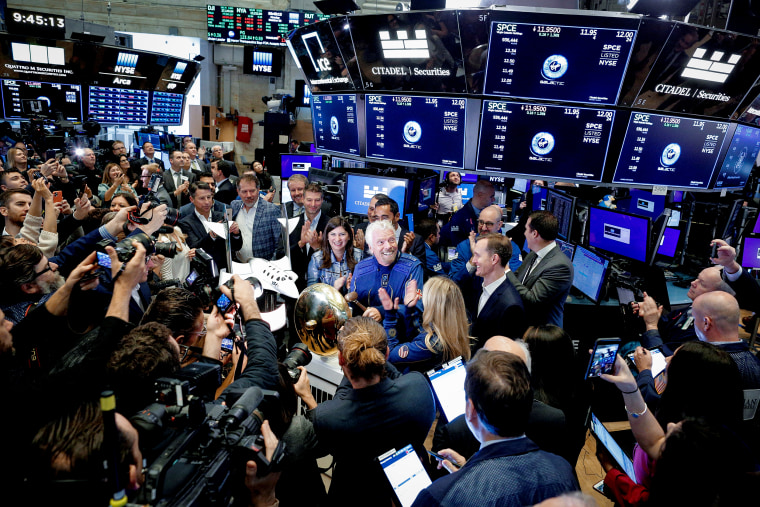Most people who buy stock would like to see ahead of time what kind of business they’re getting into. This year, the trend is to go in blindfolded.
That’s the idea behind a peculiar type of company that has burst onto the tech investing scene, though it comes with a bland name: the special purpose acquisition company, or SPAC. A SPAC is a business with no hard assets or sales — but lots of cash to acquire another company or companies to be named later, after investors have already put down millions of dollars.
They’re also called shell companies, zombie funds or blank-check companies, because the payee on their big check is yet to be determined. They’ve been around for decades, but they’ve seen a surge in interest since January.
Niron Stabinsky, a managing director at Credit Suisse, handled his first SPAC in 2005 back when they were rare and seen as a refuge for troubled assets.
“At the time, it was absolutely a four-letter word,” he said. “There was a lot of taint associated with it.”
Not anymore. This year has seen 101 new SPACs, according to a SPACInsider tally through Wednesday, up from 59 in all of 2019. Bloomberg News this week declared it a “frenzy.”
For a tech startup backed by venture capitalists, a blank-check company offers a chance to cash out personal wealth and raise new cash for operations. The goals are the same as in a traditional IPO, or initial public offering, but a SPAC is seen as simpler and more efficient, closer to a corporate merger.
The shell-company arena is attracting some big names, by necessity: The funds seem to have an advantage when they’re headed by people with connections or outsized personalities who can persuade others to part with money based partly on trust.
They include Chamath Palihapitiya, an early Facebook employee and former executive who’s now a venture capitalist as well as a frequent TV commentator and head of Social Capital Hedosophia, an umbrella for four separate shell companies. He took Richard Branson’s space-tourism company Virgin Galactic public via a SPAC last year.
Other heavyweights investing in or leading shell companies include former House Speaker Paul Ryan, R-Wis., hedge fund manager Bill Ackman, LinkedIn founder Reid Hoffman and former Oakland A’s executive Billy Beane. Gary Cohn, a former economic adviser to President Donald Trump and a former Goldman Sachs chief operating officer, has jumped in, too.
And for investors — at least, those who are willing to take the risk or can score early access — buying a piece of a SPAC amounts to a gamble that they could wind up with a valuable chunk of a fast-growing startup, maybe at a discount. The shell companies are capable of pivoting quickly, or if no good deal materializes, they may redeem their money.
Investment insiders can get a leg up. The biggest SPAC investors are told beforehand what the acquisition target is under confidentiality agreements, a preferred position compared to how retail investors are treated, Reuters has reported.
Stabinsky said the interest is feeding on itself as a “virtuous cycle”: better known investors are launching shell companies, which attracts hotter startups, which attract more investors, and so on.
A typical example played out this week. Opendoor, a real estate tech startup based in San Francisco, agreed to merge with Social Capital Hedosophia II.
Social Capital Hedosophia II went through the traditional IPO process in April, raising $414 million and saying it was on the hunt for a tech industry acquisition. Months later, it started talking to Opendoor, CNBC reported. And when that merger was announced, shares in Social Capital Hedosophia II rose 34.5 percent.
Opendoor will end up as a publicly traded company without having to go through the traditional IPO process involving a months-long road show, complex securities filings and often wildly off predictions on how much a stock will sell for.
Bill Gurley, a California venture capitalist, praised the new interest in blank-check companies in a blog post last month that’s made the rounds among investors. He wrote that traditional IPOs are often mispriced and that startups needed an alternative.
“The traditional way of going public is systematically broken and is robbing Silicon Valley founders, employees, and investors of billions of dollars each year,” he wrote.
In that sense, the growth of blank-check companies is a judgment about the efficiency of Wall Street markets and the value of long-standing securities regulations from Washington. Acquisition by a SPAC used to be a sign that a company was in trouble.
In July, the fantasy sports and betting website DraftKings successfully went public via a shell company, opening the eyes of some investors to the possibilities.
Some shell companies are running into obstacles. Airbnb, one of the biggest tech companies that’s still privately held, has so far spurned a suggestion from Ackman that the home rental company go public through his SPAC.
Shell companies are generally required to merge with a target in a specified timeframe or else return their money to investors, resulting in a lot of hassle for nothing. And even if they complete a merger, there’s no guarantee that shares will go up or beat what investors would have gotten in a traditional IPO.
A study by Goldman Sachs of 56 SPACs since 2018 found they tend to underperform the broader market.
“We’re in silly season in SPAC-land,” investor Martin Franklin told Bloomberg News this month.
“This is going to end badly,” he added.
